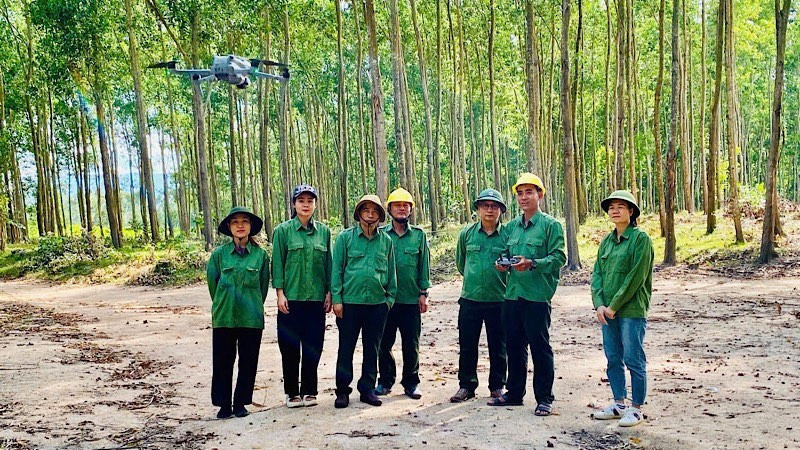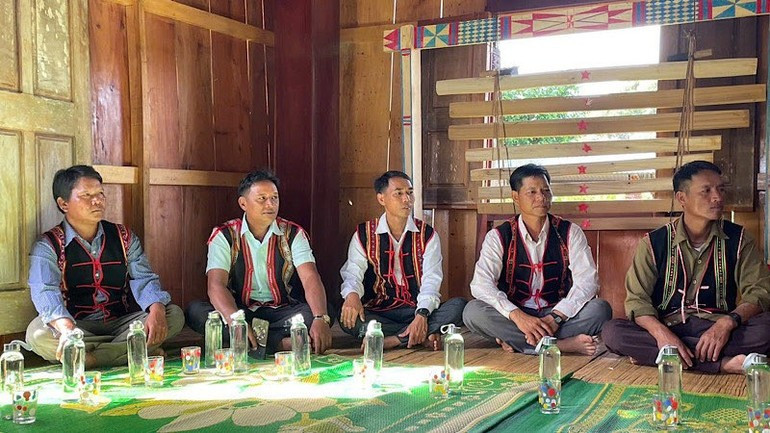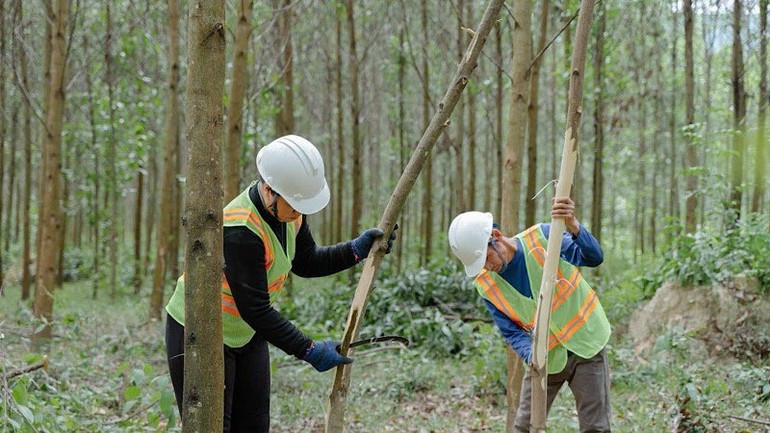Sustainable forest management and forest certification
The project on scaling up sustainable forest management and forest certification in Viet Nam (SFM) is commissioned by the German Federal Ministry for Economic Cooperation and Development (BMZ), implemented by the Forestry Project Management Board under the Ministry of Agriculture and the Environment in collaboration with the German Development Agency (GIZ).

Improving capacity for sustainable forest management
Along with a number of other forestry companies, the SFM Project is implemented at Song Kon Forestry Company Limited (Gia Lai). The beneficiaries are more than 700 households from 10 local communities, many of whom are from the Ba Na and Cham ethnic minorities. Through the development of a legal framework for cooperation, the project has supported the Company in developing a cooperation agreement to replace traditional labor contracts. This agreement establishes a clear legal framework on the rights and responsibilities of each party, ensuring the direct participation of the community in the decision-making process.
Ten cooperation agreements have been signed by the company, starting with three pioneer communities in June 2024 and expanding to seven more communities in February 2025. At the same time, the SFM Project conducted several gender training sessions, reviewed existing legal and contractual frameworks to develop gender mainstreaming models.

Comprehensive training programmes include knowledge on sustainable forest management, forest certification standards (FSC, VFCS/PEFC) and especially gender equality. The training courses use participatory and group discussion methods, helping communities master negotiation and conflict resolution skills. Previously, local communities only worked through intermediary contractors, limiting their ability to participate in decision-making and dispute resolution. The new cooperation model establishes a direct relationship between the company and the community, creating transparency and mutual trust.
Along with that, a two-way monitoring and feedback mechanism is applied, promoting cooperation agreements that empower and provide opportunities for communities to participate in and benefit from forest protection activities. At the same time, the company also receives timely feedback from the community on the forest protection situation and arising issues.
The development of community cooperation models between Song Kon Forestry Company Limited and community members and local people contributes to solving the challenges of small-scale forest management, raising the need to transform cooperation models and promote sustainable forest certification.
From the initial success with three communities, the community cooperation model has been successfully replicated. To date, more than 700 households have participated in sustainable forest management according to the model set by the project and the enterprise. bringing high economic efficiency.

When asked, Dinh Thi Inh, a Ba Na ethnic in Vinh Son commune, Vinh Thanh district, Gia Lai province, choked up and said that the new management model is very good, both bringing income to people who have contracted forests and changing the environment and local social culture.
“I hope that the project and Song Kon Forestry Company Limited will continue to implement the contract to further promote the awareness and thinking of ethnic people, contributing to improving the local economy and society,” Inh shared.
Nguyen Ngoc Dao, Chairman of Song Kon Forestry Company Limited, said that Song Kon Forestry Company Limited has been awarded the VSCF/PEFC sustainable forest management certificate, assessed and certified by Bureau Veritas Certification (Viet Nam). The certificate is granted to 1,284.7 hectares of forest and forest land that the company is managing and using. The company was established in 1992, is a 100% state-owned enterprise performing the public service of managing and protecting natural forests and performing the task of producing and trading planted forests. The area of natural forests managed by the Company is 10,476 hectares, of which rich forests account for 50%.
In 2020, the Company developed a sustainable forest management plan and managed forests according to FSC and VFCS sustainable forest management standards. In 2023, the Company registered for assessment to be granted VFCS/PEFC certification.
In addition, the Company has also applied techniques for nurturing and transforming acacia plantations that provide small timber into forests that provide large timber, improving the productivity and quality of the Company’s planted forests. Receiving the VFCS/PEFC certification helps Song Kon Forestry Company Limited’s forest products have high economic value when consumed in domestic and foreign markets. At the same time, contributing to improving the quality of afforestation, sustainable forest management and wood processing.
Applying sustainable forest management models
Also within the framework of the implementation of the Project on replicating sustainable forest management and forest certification in Viet Nam (SFM), planting large timber forests towards increasing economic value is being effectively implemented by Quy Nhon Forestry Company Limited, Gia Lai province.
In terms of scale, the project has an area of 4 hectares (in sub-area 352, Quy Nhon Tay ward, Gia Lai province). The model was planted in December 2022 and is now nearly 3 years old). In general, the application of technical processes and implementation of silvicultural technical measures are guaranteed, so from the time of planting until now, the situation of the trees growing and developing well has reached the current targets such as an average diameter of 9.7cm, an average height of 12m and an average reserve of 75m3/ha.
The application of thinning to convert small-wood plantations into large-wood plantations is being implemented effectively. Thinning is a common measure in the model of large-wood plantations, where the goal is to create high-quality large-wood. This technique shows how to select and remove crooked, poorly developed trees early in the stage to create more space and nutrients for the remaining healthy, straight-stemmed trees to grow better.
Promoting the economic advantages of the forest, the company is implementing measures to promote the forest environment, develop medicinal plants under the forest canopy, promote tourism services that are allowed to operate according to regulations and other related services to increase income from the forest.

To sustainably manage forests and manage forest areas well, Quy Nhon Forestry Company Limited applies unmanned aerial vehicles in forest monitoring. Unmanned aerial vehicles (UAVs/drones) equipped with multispectral cameras have revolutionised forest management, transforming traditional forest monitoring and inventory methods.
From checking once a month with 4 employees, forestry companies can conduct 3 checks/month with only 2 people; increasing the monitoring area from 40ha to 450ha each time and reducing the implementation time from 7 days to 2 days. In particular, UAVs have completely changed the way of monitoring forests from manual to automated methods.
Instead of employees having to walk through difficult terrain, UAVs can scan the entire area in a short time, collecting accurate and comprehensive data. The use of UAVs has completely eliminated logistics costs (100,000-150,000 VND/person/trip), reduced the required manpower by 50%, and shortened the implementation time by 3.5 times. In particular, the survey area increased 11.25 times from 40ha to 450ha per inspection.
Before applying UAVs, forest management faced many serious difficulties. Inspections were only carried out once a month due to limitations in manpower and costs. The collected data were often inaccurate due to dependence on direct observation, difficulty in accessing remote areas, and long processing times. Staff often faced dangerous terrain, harsh weather, and high risk of accidents. Illegal activities such as illegal logging were often detected late due to limited monitoring capabilities.
Director of Quy Nhon Forestry Company Limited Ngo Van Tinh said that planting large timber forests is one of the important strategic orientations of the Company in the period of sustainable development of the forestry industry associated with the value chain. The main goal is to increase the added value of planted forests through large timber production, serving deep processing, contributing to replacing imported wood; implementing sustainable forest management, minimising environmental impacts, improving carbon sequestration capacity and adapting to climate change; closely connecting with people, communities and processing enterprises, ensuring harmonious benefits and developing livelihoods for participating parties...








